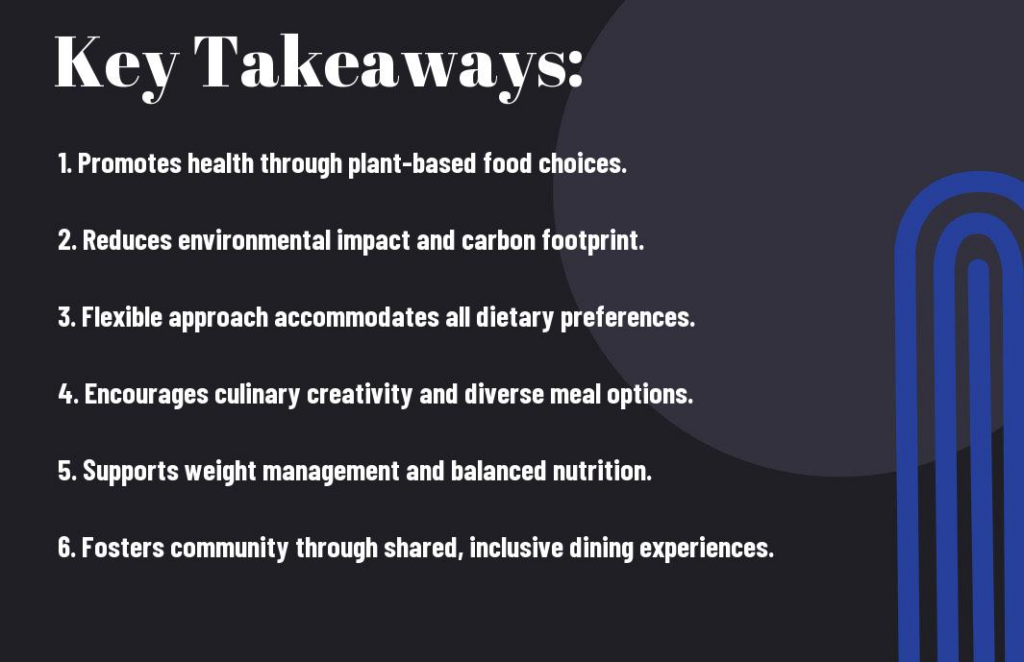Flexitarian Diet is the Future of Eating
Many people are seeking sustainable and health-conscious eating options, and the flexitarian diet stands out as a sensible choice. This flexible approach allows you to enjoy plant-based meals while still incorporating animal products in moderation. Flexitarian Diet is the Future of Eating. As you transition towards a more plant-centric lifestyle, you’ll discover numerous benefits—from improved health to reduced environmental impact. In this article, we will explore seven compelling reasons why the flexitarian diet may just be the future of eating, helping you to embrace this revolutionary trend with ease.
Key Takeaways:
- Flexibility: The flexitarian diet allows for a balanced approach by being predominantly plant-based while still permitting occasional meat consumption, making it adaptable to various lifestyles.
- Health Benefits: Research shows that a flexitarian diet can lead to improved heart health, weight management, and reduced risk of chronic diseases due to increased intake of fruits, vegetables, and whole grains.
- Environmental Impact: By reducing meat consumption, the flexitarian diet contributes to lower greenhouse gas emissions and a smaller ecological footprint, promoting a more sustainable food system.
- Culinary Diversity: Embracing a flexitarian diet encourages creativity in the kitchen, as it opens up a world of delicious plant-based meals and new ingredients.
- Community and Support: Joining the flexitarian movement connects individuals to a supportive community focused on health and sustainability, providing motivation and shared resources.

Table of Contents
Understanding the Flexitarian Diet
Definition and Overview
For those exploring healthy eating options, the Flexitarian Diet presents a flexible alternative that emphasizes plant-based foods while still allowing for occasional meat consumption. Flexitarian Diet is the Future of Eating. This hybrid approach strikes a balance, focusing on the benefits of vegetarianism with the added enjoyment of meat, making it suitable for individuals looking to enhance their health without fully committing to a strict vegetarian or vegan lifestyle. By incorporating more fruits, vegetables, whole grains, and legumes into your meals, you can reap the nutritional benefits associated with a plant-centered diet while still indulging in your favorite animal products in moderation.
On embracing the Flexitarian Diet, you are aligning with a growing trend that recognizes the importance of sustainability, health benefits, and ethical eating. This eating pattern not only promotes a healthier lifestyle but also reduces your carbon footprint, as the production of plant-based foods typically requires fewer resources than that of meat. Flexitarian Diet is the Future of Eating. Ultimately, the Flexitarian Diet invites you to explore a wider variety of foods and flavors, all while maintaining a more mindful approach to your meals.

Key Principles
Flexitarian eating is guided by a set of simple yet effective principles that encourage you to make mindful choices about your food consumption. Flexitarian Diet is the Future of Eating. The core philosophy of the Flexitarian Diet focuses on gradually increasing your intake of plant-based foods while diminishing reliance on meat and processed foods. You are encouraged to try new recipes, discover alternative sources of protein, and prioritize whole foods rich in nutrients, which not only enhances your overall health but can also lead to weight loss and improved wellness.
It’s imperative to understand that the Flexitarian Diet is all about flexibility, allowing you to enjoy your favorite meals without feeling restricted. Flexitarian Diet is the Future of Eating. You are free to set your pace, whether that means dedicating specific days as meat-free, or simply committing to incorporating more plant-based meals into your week. As you explore this diet, you may find yourself naturally gravitating toward wholesome ingredients, which can facilitate healthier eating habits and contribute to a more sustainable lifestyle overall.

Health Benefits of the Flexitarian Diet
Little by little, the Flexitarian Diet is gaining recognition not just for its flexibility but also for its substantial health benefits. By incorporating a variety of plant-based foods while still allowing for occasional meat and dairy, you can enjoy a delicious assortment of flavors without compromising your health. Flexitarian Diet is the Future of Eating. One key advantage of this diet is its potential to enrich your nutrition profile while reducing the risks of various chronic illnesses.
Nutritional Advantages
Nutritional advantages are at the heart of the Flexitarian Diet. By focusing on whole foods like fruits, vegetables, legumes, nuts, and whole grains, you are providing your body with vital vitamins, minerals, and antioxidants. These nutrients can enhance your overall health, leading to improvements in your immune system, skin health, and energy levels. Flexitarian Diet is the Future of Eating. Additionally, this approach allows you to indulge in meat less frequently, which can reduce saturated fat and cholesterol intake, contributing to better heart health.
Moreover, the Flexitarian Diet encourages diversity in the foods you consume, which is vital for promoting a balanced intake of nutrients. Flexitarian Diet is the Future of Eating. This diversity means you’ll likely enjoy more plant-based sources of protein and fiber, both of which are vital for maintaining healthy digestion and keeping you feeling fuller for longer. As you embrace this way of eating, your body will thank you for the vibrant mix of flavors and nutrients that support your long-term health.
Weight Management and Metabolism
The Flexitarian Diet can play a significant role in weight management and metabolism. By prioritizing whole, nutrient-dense foods and reducing the overall intake of processed items, you are setting yourself up for successful weight management. Flexitarian Diet is the Future of Eating. Plant-based foods tend to be lower in calories and higher in fiber, which can help you maintain a healthy weight while still feeling satisfied after meals. With less emphasis on meat and more on veggies, grains, and legumes, you can create meals that are not only filling but also supportive of sustainable weight loss.
This focus on whole foods also supports a faster metabolism. Increased fiber consumption from plant-based foods can help regulate blood sugar levels, leading to fewer spikes and crashes that often contribute to unhealthy snacking and overeating. Flexitarian Diet is the Future of Eating. By making mindful choices that harmonize with your body’s nutritional needs, you can enhance your metabolic efficiency and support long-term weight stability. The Flexitarian Diet empowers you to cultivate a lifestyle that fosters both health and satisfaction, making it an appealing option for anyone looking to achieve their wellness goals.

Environmental Impact
After exploring various dietary choices, you may be wondering how your food habits affect the planet. The Flexitarian diet not only offers health benefits but also prioritizes environmental sustainability, making it an appealing choice for those concerned with their ecological footprint. Flexitarian Diet is the Future of Eating. By adopting this mostly plant-based diet, you can contribute to a significant reduction in resource consumption and carbon emissions, helping to forge a healthier future for our planet.
Reducing Carbon Footprint
Carbon emissions are a major contributor to climate change, and the food choices you make play a pivotal role in this crisis. Livestock farming, particularly beef and dairy production, is notorious for its high greenhouse gas emissions. By reducing your meat intake through a Flexitarian diet, you can dramatically decrease your personal carbon footprint. Flexitarian Diet is the Future of Eating. Transitioning to a plant-focused diet can help lower demand for intensive farming practices, which are harmful to the environment. With each meal, you can consciously support a more sustainable food system.
Sustainable Food Choices
For those looking to minimize their environmental impact, the Flexitarian diet encourages a shift towards more sustainable food choices. By focusing on fruits, vegetables, grains, and legumes, you not only enhance your nutritional intake but also reduce reliance on animal products that require large amounts of land, water, and energy to produce. Flexitarian Diet is the Future of Eating. This approach not only supports local farms that prioritize environmentally friendly practices but also drives demand for innovative sustainable food sources.
To further boost your contribution to sustainability, consider incorporating seasonal and locally-sourced ingredients into your meals. Flexitarian Diet is the Future of Eating. By choosing foods that are grown in your region and consumed at their peak freshness, you significantly lower transportation-related emissions and support your local economy. This mindful approach allows you to be an integral part of the solution to environmental challenges, proving that every small change in your eating habits can have a significant and positive impact on the planet.

Practical Tips for Transitioning
Despite the unique challenges that come with changing your eating habits, transitioning to a flexitarian diet can be a seamless process with the right approach. Flexitarian Diet is the Future of Eating. Here are some practical tips to help you get started:
- Start with Meatless Mondays: Begin by eliminating meat from your meals once a week and gradually increase the frequency as you become comfortable.
- Experiment with Plant-Based Proteins: Explore legumes, tofu, tempeh, and seitan to replace meat in your favorite dishes.
- Focus on Whole Foods: Emphasize whole grains, vegetables, fruits, nuts, and seeds to create balanced meals.
- Pair New Foods with Familiar Ones: Combine plant-based options with your regular meals to ease the transition.
- Take Baby Steps: Don’t feel pressured to go all in at once; change can happen over time.
Thou art on a journey to redefine your relationship with food while contributing positively to your health and the environment.
Meal Planning and Preparation
On your journey to a flexitarian diet, meal planning and preparation are key elements for success. By mapping out your meals for the week, you can ensure that you incorporate a variety of plant-based ingredients into your diet. The Flexitarian Diet is the Future of Eating. This approach not only allows you to experiment with different flavors and textures but also helps promote a healthier lifestyle. Creating a shopping list based on fresh produce, legumes, grains, and other necessities streamlines your grocery trips and reduces food waste. With a well-thought-out list in hand, you can avoid impulse purchases that often lead to less nutritious choices.
Moreover, dedicating some time on the weekends to prepare meals in advance can significantly help you stick to your flexibility goals during hectic weekdays. Consider batch cooking soups, stews, or grain salads that can be stored and enjoyed throughout the week. Additionally, you can pre-chop vegetables or cook a big batch of quinoa or brown rice to use as a base for various meals. Having these wholesome dishes readily available not only saves you time but also minimizes the temptation of reverting to old eating habits when you’re pressed for time.
To add variety, you might want to explore new recipes that showcase seasonal produce or try your hand at meat substitutes that align with your flexitarian principles. Experimenting with different cuisines can also keep your meals exciting and satisfying. Engaging in meal planning not only fosters a healthier relationship with food but also makes you more mindful of your nutrition choices. Remember, the Flexitarian Diet is the Future of Eating, and with structured meal planning, you’re setting yourself up for success on this sustainable and enjoyable dietary journey.
Building Flexibility in Your Diet
Tips for building flexibility into your flexitarian diet can pave the way for a sustainable and enjoyable eating experience. Embrace the notion that not every meal should be exclusively plant-based; allow yourself the freedom to incorporate meats and dairy when you choose to. Flexitarian Diet is the Future of Eating. This mindset ensures that your dietary transition remains enjoyable and fits your lifestyle without feeling overly restrictive.
Diet flexibility can also be achieved by exploring a diverse range of cuisines that naturally emphasize plant-based ingredients. By broadening your culinary horizons, you’ll discover flavorful dishes that fit seamlessly into a flexitarian lifestyle. Flexitarian Diet is the Future of Eating. Bear in mind, it’s all about balance, and with time, you’ll find what works best for your taste preferences and nutritional needs.
Conclusion
From above, you can see that the Flexitarian Diet is not just a passing trend, but a sustainable way of living that aligns with modern values and health needs. Flexitarian Diet is the Future of Eating. By incorporating more plant-based foods into your meals, you can improve your overall wellness while also making a positive impact on the environment. This diet allows you the flexibility to enjoy your favorite foods without strict limitations, making it easier to adopt as a long-term lifestyle choice. Moreover, as you become a part of the flexitarian revolution, you are joining a growing community that prioritizes health, sustainability, and conscious eating.
Embracing the Flexitarian Diet means you are actively participating in a movement that promotes balance over extremes. With benefits ranging from improved nutrition and reduced health risks to supporting local agriculture, your choice to go flexitarian signifies a commitment to a better future. Flexitarian Diet is the Future of Eating. So, why wait? Start making small changes today by incorporating more plant-based meals into your weekly routine and discover the myriad advantages that await you on this enlightening culinary journey.
FAQ
Q: What is the Flexitarian Diet?
A: The Flexitarian Diet is a flexible eating plan that emphasizes plant-based foods while allowing for occasional consumption of meat and animal products. It prioritizes fruits, vegetables, legumes, whole grains, and nuts while still providing the freedom to indulge in meat when desired. Flexitarian Diet is the Future of Eating. This approach encourages mindful eating and promotes a balanced lifestyle without the restrictions of a strict vegetarian or vegan diet.
Q: Why is the Flexitarian Diet considered more sustainable than traditional diets?
A: The Flexitarian Diet is deemed more sustainable as it significantly reduces meat consumption, which contributes to lower greenhouse gas emissions, less land use, and reduced water consumption. Flexitarian Diet is the Future of Eating. By focusing on plant-based foods, individuals can mitigate their environmental impact while still allowing for the occasional meat-based meal, making it a more sustainable option compared to a standard meat-heavy diet.
Q: What are some health benefits of following the Flexitarian Diet?
A: Research has shown that the Flexitarian Diet can lead to numerous health benefits including weight management, improved heart health, lower risk of chronic diseases such as diabetes, and enhanced nutrient intake due to a focus on whole foods. Flexitarian Diet is the Future of Eating. The diet’s emphasis on fruits, vegetables, and whole grains provides imperative vitamins, minerals, and antioxidants that contribute to overall well-being.
Q: Can I follow the Flexitarian Diet if I have specific dietary restrictions or allergies?
A: Yes, the Flexitarian Diet is quite adaptable and can cater to various dietary restrictions or allergies. Whether you are gluten-free, lactose-free, or have nut allergies, you can modify your meals to suit your needs while still focusing on the core principles of the diet. Flexitarian Diet is the Future of Eating. It’s important to plan your meals carefully to ensure you are meeting your nutritional requirements, even with restrictions.
Q: How can I get started with the Flexitarian Diet?
A: To begin with the Flexitarian Diet, start by incorporating more plant-based meals into your weekly routine. Aim for at least three to four meals a week that are vegetarian, using wholesome ingredients like legumes, vegetables, grains, and healthy fats. Flexitarian Diet is the Future of Eating. Gradually decrease your meat consumption and explore new recipes and cooking techniques. Additionally, consider joining communities or online forums for support and inspiration on your flexitarian journey.



